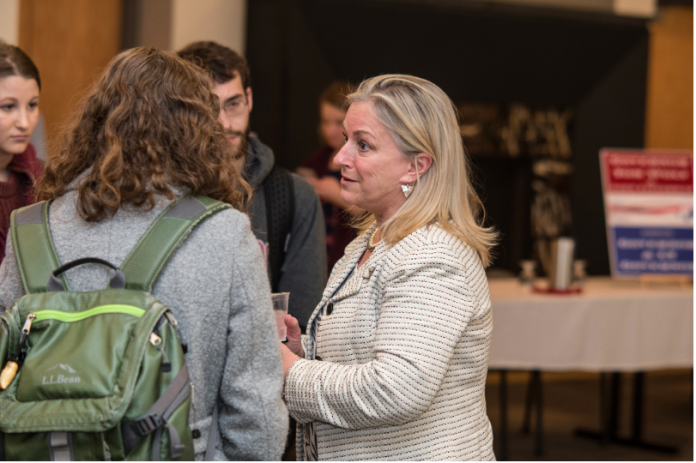
A month has passed since the Nov. 6 midterm elections, and many Americans are now evaluating and reflecting on the election’s results. The close races in many states led to an overall increase in voter turnout which was reflected in Muhlenberg’s student body as well.
“Turnout among Muhlenberg students and young Americans in general was much higher than during the last midterm in 2014,” says political science professor Christopher Borick. “According to polling among this group dissatisfaction with the current state of affairs in Washington and in particular President Trump played a major role in getting young voters to the polls.”
With many contested races and controversies over voter suppression, the results of the midterm elections are still at the forefront of political and news media. In today’s heated political climate, increased voting rates and political engagement seems to be expected.
“A total of 680 current students were registered at 2400 Chew St,” explains political science professor Michele Deegan. “We won’t know until next year how many were registered to vote in their home counties. 894 people voted here but because our voting precinct includes neighbors, we won’t know until the National Student Learning and Voter Engagement project sends us our data that matches all of our students with their voting records, how many of those are actual students and how many Berg students voted off campus or absentee.”
Beth Halpern, Director of The Office of Community Engagement, explains another resource Muhlenberg uses to collect data on campus voting results called CIRCLE (Center for Information and Research on Civic Learning and Engagement).
“[The CIRCLE study] will give us information regarding our voter registration rates and participation rates for 2018. They track both students that voted on campus and those who vote absentee, so it gives us a really good picture of voter engagement,” says Halpern.
When going to the polls to vote, students considered a variety of pressing concerns in making their decisions. In a BergVotes Issues Expo held before the election, students cited the issues most important to them, ranging from gun laws and international relations to LGBTQ+ issues and immigration policy.
“Issues like health care, environmental protection and women’s rights were among the most salient concerns among college age voters in the 2018 Midterms,”
“Issues like health care, environmental protection and women’s rights were among the most salient concerns among college age voters in the 2018 Midterms,” says Borick.
Not only did Muhlenberg students show up to vote on Election Day, many helped organize a number of exciting campus activities and some volunteered at polling centers.
“We had 26 Berg students participate off campus as Poll Workers or Spanish Language Translators and another dozen or so working with the MCIPO conducting Exit Polls,” says Deegan. “Election Day was packed with activities hosted by BergVotes with campus offices including the Office of Residential Life and Housing’s Election Day Party, the Multicultural Life Office Food Truck and the Election Night Watch party, which [was] part of the Election Series. On Election Day and the day after we hosted an election reflection wall, which provided an opportunity to give voice about the election in a private space. We gave out “I voted” stickers to anyone voting and supporting voters. Sodexo also made a huge cupcake table spelling out “Vote” in the DHall.”
While voter turnout and participation was higher than usual on Election Day and the weeks leading up to it, it is apparent that continued engagement is of utmost importance even when an election is not imminent.
“What I’m most interested in seeing is if the energy and engagement among Muhlenberg students and young Americans will continue moving forward,” says Borick. “I’m optimistic that we will see a carry over into upcoming years and particularly on campus where groups like BergVotes helped to enhance interest and understanding of the issues and promote engagement.”
Professor Deegan is also optimistic about student engagement.
“We are really happy with the level of engagement of the entire campus. 2019 has a lot of local elections including the Mayor’s race. BergVotes is looking to add new members and continue conversations on campus,” she explains.
“We are really happy with the level of engagement of the entire campus. 2019 has a lot of local elections including the Mayor’s race. BergVotes is looking to add new members and continue conversations on campus,”
Continued political interest is necessary for a representative and active democracy and there are many ways that Muhlenberg students can get involved and participate in ongoing political conversations on campus.
“There is so much to do now that the election is over!” says Halpern. “We need to continue to hold our representatives accountable to the issues that are of most importance to us. We need to continue educating ourselves on issues and ensuring that our representatives are truly listening to their constituents. We need to continue to be involved in the process from multiple scales, local to global, to positively impact ourselves and our communities and ensure voices are heard. And, of course, we need to continue registering people to vote and voting. There are elections twice per year so it’s not over now!”






















It’s truly very complicated in this full of activity life to listen news on Television,
therefore I just use internet for that purpose, and get the most recent news.